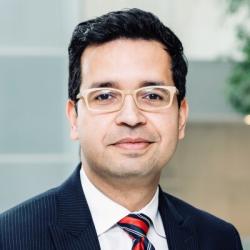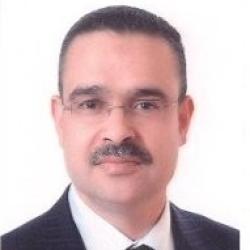Strengthening AML/CFT and risk oversight: central bank strategies for dynamic challenges
Strengthening AML/CFT and risk oversight: central bank strategies for dynamic challenges
Strengthening AML/CFT and risk oversight: central bank strategies for dynamic challenges
Date: June 25-27, 2024
Time: 9am-12pm (EDT) | 1pm-4pm (BST) | 2pm - 5pm (CET) I 8pm-10pm (SGT)
Location: Virtual
Chair and Speakers

Chair: Suyog Peshkar
Section chief, third party risk management
International Monetary Fund
All financial organizations currently face an exceptionally challenging external environment: increasing regulatory pressures, heavy reliance on external third-parties, dominance of cloud based services and Artificial Intelligence (AI), all amid makes issues related to Third Party Risk Management prominent for both regulators and organizations alike.
With a track record of successfully establishing a robust third party risk management (TPRM) function at the International Monetary Fund (IMF), Section Chief, Suyog Peshkar brings a unique perspective on the intersection of operational risks and outsourcing.
In his twenty plus years’ experience, Suyog has advised global firms as well as provided hands-on expertise in delivering outsourcing solutions to generate higher cost savings, mitigate risks and derive efficiencies. Suyog completed a LLM in Commercial and Corporate Law from the University of London and a Masters in Analysis, Design and Management of Information Systems from the London School of Economics (LSE), which enables him to provide ‘techno-legal’ advisory on complex issues related to sourcing governance, risk management and third party compliance.
Recognized as an operational and third party risk expert, Suyog is regularly invited to speak at industry conferences, risk panels and UN seminars.

Eka Goglidze
Head of division for international sanctions’ implementation and inspection and offsite supervision of the VASPs
National Bank of Georgia
I am Eka Goglidze, professional specializing in Compliance for over 10 years, including 5 years’ experience in AML/CFT and also compliance with the international sanctions. My journey in these fields have been diverse, encompassing both private and public sectors.
Over the last five years, I have gained a comprehensive experience in AML/CFT. I was engaged in onsite inspections of the commercial banks for several years, and contributing to legislative developments in this field. In addition, I played a crucial role in the introduction of a robust supervisory/regulatory system for Virtual Asset Service Providers (VASPs).
During my career at the public sector, I was permanently involved in international collaboration, managing technical assistance programs and fostering communication with diverse stakeholders, including financial sector representatives and public officials from various countries.
A career highlight? A highlight of my career was establishing, managing and guiding the division responsible for the regulatory/supervisory framework of VASPs, as well as supervision of International Sanctions compliance. This role has been challenging, but resulted in significant progress for my division, positioning it as an important player worldwide in AML/CFT supervision of VASPs. It also contributed to our country achieving remarkable results in international sanctions compliance within the region.

Pierpaolo Fratangelo
Director, anti-money laundering division
Banca d'Italia

Arafat Fayoumi
Executive manager, AML/CFT supervision department
Central Bank of Jordan

Sophia Asanidze
Acting head of money laundering inspection and supervision department
National Bank of Georgia
My compliance experience spans almost 20 years. My career progression in supervision was greatly influenced by my experience in the private banking sector. Approaching processes from a business standpoint enabled me to maintain a balanced approach as a supervisor.
Notable project I spearheaded was the implementation of off-site supervision for financial sector in 2015. Together with my team I developed a risk matrix to gather sector information and assign risk, facilitating the effective determination of risk-based supervisory measures. Our off-site risk assessment model has been adopted by several countries, including those in Europe, to enhance the efficiency of their supervisory processes.
In 2020, Moneyval (Committee of Experts on the Evaluation of Anti-Money Laundering Measures and the Financing of Terrorism) evaluated Georgia's compliance with FATF 40 Recommendations. This involved extensive work, such as updating guidance documents for financial institutions, establishing a new supervisory framework, and conducting sector training. I led this entire process, which resulted in a positive evaluation of the National Bank of Georgia. Subsequently, I was chosen as an evaluator for Moneyval. As a result, in 2022, I participated in evaluating Romania's AML/CFT system in terms of preventing money laundering and countering the financing of terrorism which I think was a great experience.
Since January 2023, I serve as the Head of the AML Department and play an active role in implementing the VASPs supervisory framework and ensuring international sanctions compliance. The supervisory measures carried out together with my team significantly contributed to receiving positive responses from international partners, positioning our country as a regional leader in both areas.

Ross Delston
Independent attorney
ROSS DELSTON is an independent American attorney, expert witness, and former banking regulator (FDIC) who has specialized in AML/CFT issues since July 2000. Ross has participated in the monitorships of AIG and BNP Paribas, and has been named as an expert witness on AML issues in 23 civil and criminal cases in the US and Canada. Ross has also been a consultant to the IMF on AML/CFT and banking matters since 1997 and has participated in nine AML/CFT assessments of offshore financial centres, including Jersey, Bermuda, and St. Vincent and the Grenadines. In that role, he has drafted laws for numerous countries and has trained government officials and commercial bankers in Africa, Asia, Eastern Europe and the former Soviet Union. Additionally, he was a consultant to the World Bank from 1998 – 2014 on banking regulation, resolution, and insolvency issues. Ross is a frequent lecturer on AML/CFT and banking topics, including presentations at the IMF, the Reserve Bank of India, and the Peoples Bank of China, and has been quoted in the New York Times, Times of London, Washington Post, Wall Street Journal, and Reuters.

Naa Welbeck
Technical advisor
Bank of Ghana
An economic and financial professional with over ten(10) years’ experience, working in varied capacities with the central bank of Ghana in the areas of AML/CFT&P, Consumer Protection, Fintech and Non-Bank Financial.
Chair and Speakers
13:00 – 13:15
Chair welcome and course introduction
13:00 - 13:15
Introductions and welcome from the chairperson
Overview of the training course
Discussion of the participant expectations
All financial organizations currently face an exceptionally challenging external environment: increasing regulatory pressures, heavy reliance on external third-parties, dominance of cloud based services and Artificial Intelligence (AI), all amid makes issues related to Third Party Risk Management prominent for both regulators and organizations alike.
With a track record of successfully establishing a robust third party risk management (TPRM) function at the International Monetary Fund (IMF), Section Chief, Suyog Peshkar brings a unique perspective on the intersection of operational risks and outsourcing.
In his twenty plus years’ experience, Suyog has advised global firms as well as provided hands-on expertise in delivering outsourcing solutions to generate higher cost savings, mitigate risks and derive efficiencies. Suyog completed a LLM in Commercial and Corporate Law from the University of London and a Masters in Analysis, Design and Management of Information Systems from the London School of Economics (LSE), which enables him to provide ‘techno-legal’ advisory on complex issues related to sourcing governance, risk management and third party compliance.
Recognized as an operational and third party risk expert, Suyog is regularly invited to speak at industry conferences, risk panels and UN seminars.
13:15 – 14:15
Effective strategies for building a risk-based AML/CFT supervisory framework
13:00 - 14:00
Sophia Asanidze
Acting head of money laundering inspection and supervision department
National Bank of Georgia
My compliance experience spans almost 20 years. My career progression in supervision was greatly influenced by my experience in the private banking sector. Approaching processes from a business standpoint enabled me to maintain a balanced approach as a supervisor.
Notable project I spearheaded was the implementation of off-site supervision for financial sector in 2015. Together with my team I developed a risk matrix to gather sector information and assign risk, facilitating the effective determination of risk-based supervisory measures. Our off-site risk assessment model has been adopted by several countries, including those in Europe, to enhance the efficiency of their supervisory processes.
In 2020, Moneyval (Committee of Experts on the Evaluation of Anti-Money Laundering Measures and the Financing of Terrorism) evaluated Georgia's compliance with FATF 40 Recommendations. This involved extensive work, such as updating guidance documents for financial institutions, establishing a new supervisory framework, and conducting sector training. I led this entire process, which resulted in a positive evaluation of the National Bank of Georgia. Subsequently, I was chosen as an evaluator for Moneyval. As a result, in 2022, I participated in evaluating Romania's AML/CFT system in terms of preventing money laundering and countering the financing of terrorism which I think was a great experience.
Since January 2023, I serve as the Head of the AML Department and play an active role in implementing the VASPs supervisory framework and ensuring international sanctions compliance. The supervisory measures carried out together with my team significantly contributed to receiving positive responses from international partners, positioning our country as a regional leader in both areas.
14:15 – 14:30
Break
12:45 - 13:00
14:30 – 16:00
Key issues in risk, supervision and regulation of banks and Non-Bank Financial Institutions
15:00 - 16:00
- Risk rating of banks and financial groups, including products/services, customers/clients, delivery mechanisms, and geographies:
- Interplay between on- and off-site supervision, including judgmental vs. random sampling;
- Regulation and supervision of Money Value Transfer Services (MVTS), including payment services providers; and
- Three real-life examples of supervisory failures involving banks and other Financial Institutions in the US: Jeffrey Epstein and Deutsche Bank, the 1MDB Malaysian sovereign wealth fund, and the FTX cryptocurrency exchange and Sam Bankman-Friedman.
ROSS DELSTON is an independent American attorney, expert witness, and former banking regulator (FDIC) who has specialized in AML/CFT issues since July 2000. Ross has participated in the monitorships of AIG and BNP Paribas, and has been named as an expert witness on AML issues in 23 civil and criminal cases in the US and Canada. Ross has also been a consultant to the IMF on AML/CFT and banking matters since 1997 and has participated in nine AML/CFT assessments of offshore financial centres, including Jersey, Bermuda, and St. Vincent and the Grenadines. In that role, he has drafted laws for numerous countries and has trained government officials and commercial bankers in Africa, Asia, Eastern Europe and the former Soviet Union. Additionally, he was a consultant to the World Bank from 1998 – 2014 on banking regulation, resolution, and insolvency issues. Ross is a frequent lecturer on AML/CFT and banking topics, including presentations at the IMF, the Reserve Bank of India, and the Peoples Bank of China, and has been quoted in the New York Times, Times of London, Washington Post, Wall Street Journal, and Reuters.
13:00 – 14:00
Third party risk management from regulation to practice
13:15 - 14:00
- Expectations on managing third-party risk
- Guidance on risk-management frameworks and lifecycles
- Assessing the levels of risk-impact
- Governance and best practices around oversight, independent reviews, and documentation & reporting
All financial organizations currently face an exceptionally challenging external environment: increasing regulatory pressures, heavy reliance on external third-parties, dominance of cloud based services and Artificial Intelligence (AI), all amid makes issues related to Third Party Risk Management prominent for both regulators and organizations alike.
With a track record of successfully establishing a robust third party risk management (TPRM) function at the International Monetary Fund (IMF), Section Chief, Suyog Peshkar brings a unique perspective on the intersection of operational risks and outsourcing.
In his twenty plus years’ experience, Suyog has advised global firms as well as provided hands-on expertise in delivering outsourcing solutions to generate higher cost savings, mitigate risks and derive efficiencies. Suyog completed a LLM in Commercial and Corporate Law from the University of London and a Masters in Analysis, Design and Management of Information Systems from the London School of Economics (LSE), which enables him to provide ‘techno-legal’ advisory on complex issues related to sourcing governance, risk management and third party compliance.
Recognized as an operational and third party risk expert, Suyog is regularly invited to speak at industry conferences, risk panels and UN seminars.
14:00 – 15:00
Regulatory landscape for virtual asset service providers (VASPs) in Georgia: A deep dive into AML/CFT compliance
14:00 - 15:00
- Explore in Scope of VA services, along with key definitions and the supervisory scope over VASPs;
- Examine the VASP registration process at the NBG, which includes Fit and Proper checks, scrutiny of products (including the flow of fiat and VA), assessment of business plans, adherence to AML/CFT requirements, and demonstration of the operating and AML/CFT systems;
- Understand emerging challengeEs arising from the idiosyncrasies of VA and underlying technologies, such as difficulties in implementing Travel Rule regulations and ensuring proper onsite/offsite supervision
Eka Goglidze
Head of division for international sanctions’ implementation and inspection and offsite supervision of the VASPs
National Bank of Georgia
I am Eka Goglidze, professional specializing in Compliance for over 10 years, including 5 years’ experience in AML/CFT and also compliance with the international sanctions. My journey in these fields have been diverse, encompassing both private and public sectors.
Over the last five years, I have gained a comprehensive experience in AML/CFT. I was engaged in onsite inspections of the commercial banks for several years, and contributing to legislative developments in this field. In addition, I played a crucial role in the introduction of a robust supervisory/regulatory system for Virtual Asset Service Providers (VASPs).
During my career at the public sector, I was permanently involved in international collaboration, managing technical assistance programs and fostering communication with diverse stakeholders, including financial sector representatives and public officials from various countries.
A career highlight? A highlight of my career was establishing, managing and guiding the division responsible for the regulatory/supervisory framework of VASPs, as well as supervision of International Sanctions compliance. This role has been challenging, but resulted in significant progress for my division, positioning it as an important player worldwide in AML/CFT supervision of VASPs. It also contributed to our country achieving remarkable results in international sanctions compliance within the region.
15:00 – 15:15
Break
12:45 - 13:00
15:15 – 16:00
Understanding Politically Exposed Persons (PEPs) and AML Compliance
15:00 - 16:00
- Defining PEPs: Exploring the characteristics and classifications of Politically Exposed Persons, including foreign and domestic PEP
- Identifying Money Laundering Risks
- Implementing Enhanced Due Diligence: Understanding the FATF Recommendation 12 (R.12) and its requirements for financial institutions regarding PEPs, including risk management systems
- Risk Mitigation Strategies: Exploring industry best practices and risk-sensitive policies for identifying and managing PEP-related risks
13:00 – 14:15
Central Bank of Jordan’s journey to FATF compliance
13:00 - 14:00
- Risk-based supervision in the AML/CFT field
- Case study on how the Central Bank of Jordan was successfully removed from the FATF greylist
- Action plan and main objectives to ensure successful removal
- Key policy changes to ensure long-term effective AML/CFT supervision
14:15 – 14:30
Break
12:45 - 13:00
14:30 – 15:30
eKYC and digital onboarding in Ghana
14:30 - 15:30
- Exploring the Ghanaian Shift with the Ghana Card
- Regulatory frameworks, compliance and governance regarding the Ghana card
- Benefits in leveraging the Ghana Card for digital identity verification
- Risks and challenges in eKYC and digital onboarding initiatives
An economic and financial professional with over ten(10) years’ experience, working in varied capacities with the central bank of Ghana in the areas of AML/CFT&P, Consumer Protection, Fintech and Non-Bank Financial.
15:30 – 16:00
Closing remarks and delegate action plans
Concluding session led by the chair
13:00 - 13:30
- Summary of the course
- Discussion of the observed trends and case studies
- Application of learning points in the delegates’ home organisations
- Preparation of action points
Learning Outcomes
At the conclusion of the training, participants will be able to:
- Understand how necessary legal and regulatory frameworks are important in building a robust AML/CFT framework in accordance with international compliance standards
- Analyse case studies from different central banks who have successfully removed themselves the Financial Actional Task Force (FATF) grey list
- Navigate through the regulatory landscape and associated risks when dealing with Virtual Asset Service Providers (VASPs) and Crypto Asset Service Providers (CASPs)
- Build a holistic approach towards AML and Cybersecurity through the integration of vast amounts of data, transaction records and the identification of suspicious activity, thereby maintaining integrity and security of the financial system